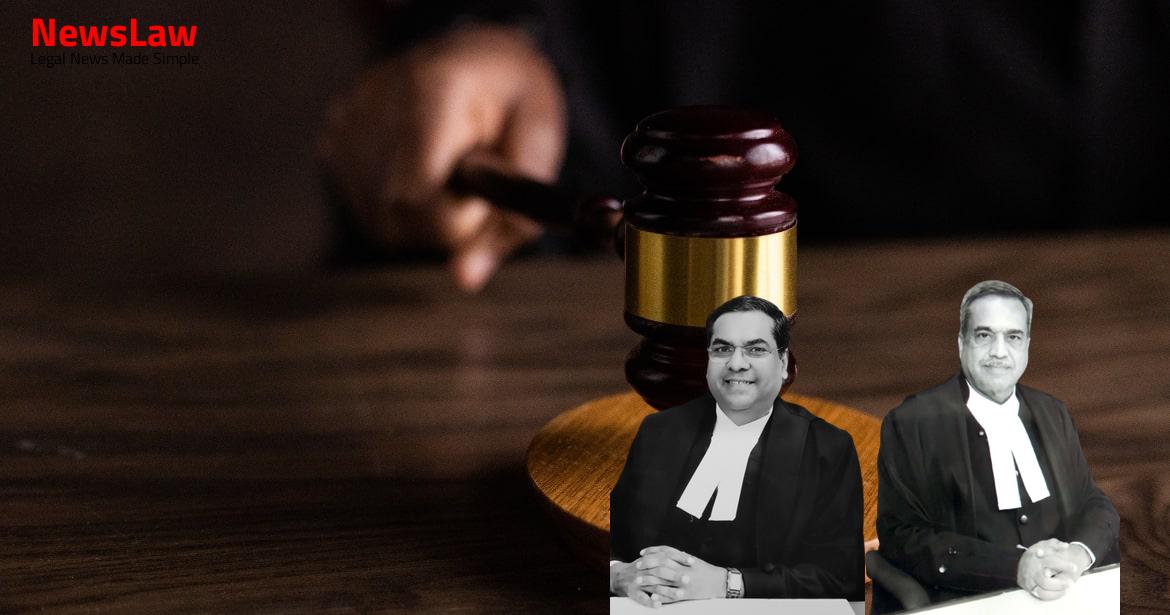Explore the in-depth legal analysis of a recent case concerning compliance with Section 42 of the NDPS Act. The court’s thorough examination of the provisions and their application in the context of the case sheds light on the complexities of legal procedures and their implications on the final judgment. Find out how the court’s interpretation of Section 42 played a pivotal role in determining the outcome of the case.
Facts
- The Trial Court stated that the defense argument regarding non-compliance of Section 42 of the NDPS Act would only be relevant if the recovery had been made from the house or building of the accused.
- However, in this case, the recovery was made from the accused individuals while they were sitting in a jeep at a public place.
- The writing work related to the case was also done while sitting in the jeep.
- The appeal challenges a judgment by the High Court of Punjab & Haryana that affirmed the conviction of the appellants under Section 15 of the NDPS Act.
- The prosecution’s case involved receiving secret information about the accused selling poppy straw in a vehicle, leading to their apprehension during a raid.
- The jeep, a weighing scale, and two weights of 500 grams each were recovered during the raid.
- Two samples weighing 100 grams each were separated from each bag of poppy straw found in the jeep.
- The raid was conducted at the canal bridge on Surtia Rori-road during patrolling.
- The accused were found sitting on two bags in the jeep and were subsequently apprehended.
- One bag contained 39 kg of poppy straw, and the other bag contained 36 kg of poppy straw.
- Notices under Section 50 of the NDPS Act were served, but the accused reposed faith in the police officials instead of opting for search before a gazetted officer or a Magistrate.
- The accused Major Singh managed to escape while the appellants were caught at the scene.
- The charge was framed, and the appellants pleaded not guilty, claiming trial.
- The prosecution presented documentary evidence and examined four witnesses to support its allegations.
Also Read: Electoral Malpractices in Mayor Election
Arguments
- The vehicle in question was a private vehicle belonging to accused Gurdeep Singh
- The vehicle was not a public conveyance, despite being parked on a public road
- Mr. Rakesh Mudgal, learned AAG argued that the lower courts correctly determined that the case should be governed by the provisions of Section 43 of the NDPS Act.
Also Read: Balancing Power and Transparency: Electoral Bonds Struck Down, Disclosure Mandated
Analysis
- Non-compliance with Section 42(1) and Section 42(2) was proven on the record.
- The High Court correctly set aside the conviction order based on non-compliance.
- Section 43 did not apply in the present case, which made Section 42 applicable.
- Delayed compliance with satisfactory explanation is acceptable under Section 42.
- In special circumstances, urgency and expediency may justify delayed compliance.
- Total non-compliance with Section 42 requirements is impermissible.
- If an officer receives information of certain nature, it must be recorded in writing in the register and a copy sent to the immediate official superior before taking action.
- Section 42 of the Act is not applicable to the present case.
- If the information is received while the officer is on the move and immediate action is required to prevent removal or destruction of goods or evidence, he can proceed with action first and record the information later.
- Abdul Rashid case did not require literal compliance with Sections 42(1) and 42(2).
- There was no need for complete non-compliance with Section 42 for entitlement to acquittal.
- The decision in Karnail Singh v. State of Haryana was followed in Sukhdev Singh v. State of Haryana and State of Rajasthan v. Jagraj Singh alias Hansa.
- Total non-compliance of Section 42 is impermissible.
- The rigor of Section 42 may be lessened in certain situations as per the conclusion drawn in Karnail Singh but total non-compliance cannot be accepted.
- The courts below made an error in rejecting the submissions of the appellants.
Also Read: Recall of Resolution Plan Approval: Legal Analysis
Decision
- Appeal allowed
- High Court’s view set aside
- Appellants acquitted
- Appellants to be released unless needed for another offense
Case Title: BOOTA SINGH Vs. THE STATE OF HARYANA (2021 INSC 256)
Case Number: Crl.A. No.-000421-000421 / 2021



